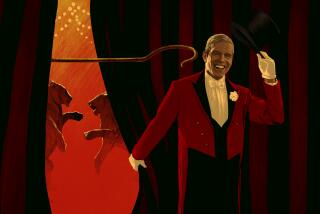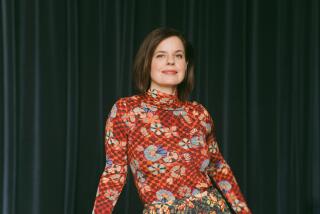Today’s sitcoms show a wider range of realistic, and funny, women
It took decades for the women of sitcoms to climb past simply serving their men to being lovable ditzes. But today’s female characters have emerged from that bunker — some literally — into a spotlight of their own.
In shows new (“Broad City,” “Unbreakable Kimmy Schmidt”) and a little less new (“Louie,” “Girls”), women are coming into their own in edgier, more center-stage kind of ways. They can be bruisingly honest and independent with no problem saying no; or an odd couple of wild id and responsible ego bound by real caring; or a trauma survivor who’s stayed perky with only occasional outbursts of homicidal rage. Sometimes they’re writing their own material to make it happen, and sometimes the material is being designed with their DNA, but from any angle, they’re pulling no punches.
“I read some stuff people write about the show online, and men in particular, and women, they like that in-your-face” type, says Pamela Adlon, producer and frequent costar of FX’s “Louie,” the de facto sitcom that plays more like a series of independent films. Her character doesn’t play hard to get with the protagonist; what she plays is more like emotional Rollerball.
FULL COVERAGE: Emmys 2015
Yet Louie is hooked. “Maybe because she makes him feel very alive because she gives him a hard time. It makes you feel your life when somebody’s very frank and going past a point of courtesy.”
Adlon has collaborated with star and creator Louis C.K. on stories and scripts since the show’s inception. Still, she admits to surprise at how far her character, suspiciously also named Pamela, occasionally goes. Not that she apologizes for the character’s unapologetic nature: “I admire people who are constant and not afraid of being [jerks]. I fear them, but I admire them.”
Pamela isn’t Adlon’s first no-restraining-bolt character. She played the no-regrets Marcy on Showtime’s “Californication” as well. “Marcy was, for all intents and purposes, a female Hank Moody,” she says, referencing David Duchovny’s “Californication” role.
It’s those kinds of characters that the women now hitting the scene admire so much.
“Pamela Adlon … what a bad ass,” says Ilana Glazer, whose character on Comedy Central’s “Broad City” might give the hyper-hedonistic Marcy and Hank a run for the defibrillator.
Glazer and Abbi Jacobson play fun-house versions of themselves on “Broad City,” chronicling the misadventures of two twentysomethings. Emanating from a Web series the pair created after meeting at the Chicago comedy troupe Upright Citizens Brigade, the show gleefully goes there in gonzo fashion. At its heart, though, it’s about a dear friendship.
“The friendship on the show stems from our genuine closeness in real life,” says Glazer, whose Ilana Wexler comes through for loved ones despite her extreme behavior. “In real life, we’re running a business together; on the show, there’s no driving purpose other than their friendship. It’s nice to take a break sometimes and just be those characters.”
Jacobson, whose relatively straight-and-narrow Abbi Abrams is constantly humiliating herself, says, “Because they’re based on us in so many ways, it was a big examination of ourselves. We took all our insecurities and the differences between us and how we interacted with each other, and blew it up.”
All three women credit Lena Dunham’s “Girls” with exploring some of this territory several years ago.
“The thing I love about ‘Girls’ is I relate to it because I have friendships that have grown and changed, and I think those characters are really fighting it,” Jacobson says. “They do love each other, but they’re at a moment in their lives where things are really changing.”
“Lena Dunham knocks my socks off with everything she does,” notes Adlon. “She’s writing books, she’s making great television, she’s making great films, she’s working for Planned Parenthood. She’s a total inspiration to me, across the board.”
Ellie Kemper comes at her starring role from a slightly different starting point. Remembered as adorable and fresh-faced on “The Office” and “Bridesmaids,” Kemper didn’t create the title character on Netflix’s “Unbreakable Kimmy Schmidt”; it was crafted for her by the “30 Rock” team of Robert Carlock and Tina Fey.
“Kimmy has something of a temper. She’s quick to fight what she sees as injustice. We might share that in common.”
She acknowledges the role of a woman locked underground for years by a cult leader requires more range than any she has had before “because most of the characters I’ve played have tended to be sunny, upbeat people. Certainly, Kimmy comes from a complicated, difficult, traumatic past. The show is a comedy, but there are issues that can’t be glossed over.”
Though aware of past pigeonholing of women in comedy, these new female roles aren’t necessarily the product of a campaign for change. The women themselves see it as more of the organic result of a gradual societal shift.
Jacobson says the male-heavy New York comedy scene she and Glazer came from never felt restrictive, women or no. “I think that’s why when we started making the videos it wasn’t, ‘We need to show how women really are!’ We didn’t make a mission statement. It’s just how we were, how all our friends were. Maybe we’re at a time when there are more content creators that are women.”
Glazer adds, “There are also more platforms for content to be seen, so people don’t have to wait for someone who looks like them to choose them. We just chose to broadcast ourselves. The question, ‘Are women funny?’ used to be an article topic three years ago [as Kemper answered in the pages of GQ in 2013], and that question is so gross, so lame and so over now.”
“Because it’s obviously no, right?” interjects Jacobson, and both laugh.
More to Read
From the Oscars to the Emmys.
Get the Envelope newsletter for exclusive awards season coverage, behind-the-scenes stories from the Envelope podcast and columnist Glenn Whipp’s must-read analysis.
You may occasionally receive promotional content from the Los Angeles Times.






